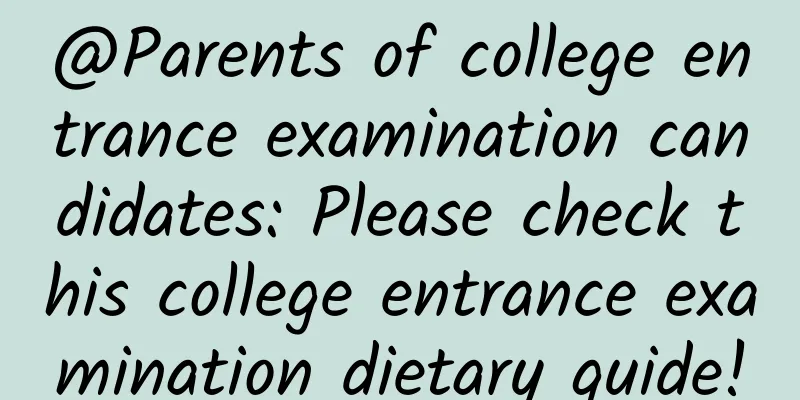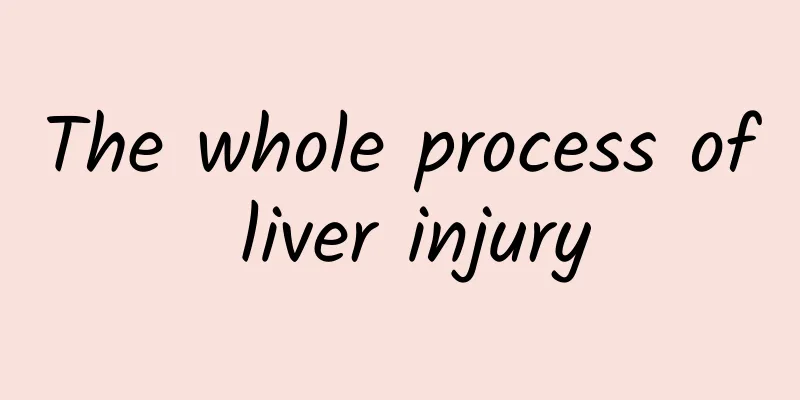@Parents of college entrance examination candidates: Please check this college entrance examination dietary guide!

|
The college entrance examination is a big event for students and families. Parents are anxious but cannot show it. They can only concentrate on doing some logistical work, such as finding ways to make sure their children eat well. So, how to prepare meals for children during the college entrance examination? This question seems a bit complicated, but in fact, it can be deduced from the characteristics of the college entrance examination - the so-called "college entrance examination" is an examination held in the summer. 1. Prevent heat stroke The first characteristic of summer is heat. In recent years, summer temperatures have hit new highs, and it is not uncommon for temperatures to reach over 30 degrees Celsius in early June. High temperatures mean more sweat, and the evaporation of sweat will take away water and inorganic salts . These two types of substances are important for maintaining normal physiological activities. If you don't pay attention to replenishing them, it can cause a decrease in energy at the mildest, and heat stroke in severe cases, with symptoms such as fever, dizziness, vomiting, and even life-threatening. Sunshade, sun protection, hydration, and prevention of heat stroke Therefore, attention should be paid to replenishing water and inorganic salts for the candidates. **First, pay attention to the source. **Warm boiled water is best, and you can add a little salt when necessary. As for alcohol, coffee, and sugary drinks, they not only do not quench your thirst, but will increase water loss. **Second, drink in small amounts and frequently. **Prepare a water bottle for your child and encourage him to drink a few sips during breaks or rest periods. **Third, learn to judge. **Sweating all over, feeling thirsty, and darker urine are all signs of insufficient water. 2. Prevent Food Poisoning The second characteristic of summer is that food poisoning is prone to occur. According to government reports and various studies, the total number of food poisoning cases in China has been decreasing in recent years; however, within a single year, May to September is always the peak period for food poisoning. **There are roughly three reasons: **First, the temperature is high and bacteria reproduce quickly, so food may be contaminated during processing and storage; second, people prefer cold dishes, and the food processing may not be thorough enough, making it difficult to kill microorganisms; third, foods that are prone to poisoning, such as green beans and poisonous mushrooms, are more common at this time. French beans On the other hand, as long as the above three aspects are done well, food poisoning can be effectively avoided. For food ingredients that are easily contaminated by bacteria, such as meat, you can wash them after buying them, prepare special knives and cutting boards when cooking, thaw them immediately, and do not put them together with other ingredients; at the same time, please note that bacteria may contaminate your hands, so you must wash your hands promptly and carefully. For cold dishes, it is best to prepare them and eat them immediately. If you cannot finish them, put them in the refrigerator within 2 hours, otherwise the bacteria may exceed the standard. It is best not to eat unfamiliar ingredients. In other words, do not make major changes to the diet at this time. If your child particularly likes green beans, make sure to cook them thoroughly. Raw green beans contain saponins and lectins, which can irritate the digestive tract and even damage red blood cells if eaten by mistake. Experts recommend that green beans should be cooked for at least 30 minutes to fully destroy the harmful substances in them. 3. Ensure brain nutrition Taking exams naturally requires abundant brain power. Compared to other organs, the brain has both common and special features. For example, the former means that the brain needs energy, which mainly comes from blood sugar, and also requires an appropriate amount of protein and lipids, a considerable part of which can only be obtained from food and cannot be synthesized by itself; the latter means that the brain is particularly sensitive to certain nutrients. If these nutrients are insufficient, it may affect the brain's operating efficiency. So, what are these nutrients? Nutritionists have mentioned them many times, including vitamin C, vitamin B12, magnesium, selenium, etc. Taking vitamin C as an example, a 2019 study showed that its plasma concentration has an inverted U-shaped relationship with attention, memory, and the speed of judging things: insufficient vitamin C (<28 μmol/L) leads to decreased cognitive ability; excessive vitamin C (70 μmol/L) does not bring any additional benefits. From this, three principles can be summarized. **First of all, you must provide your children with sufficient and high-quality food. **When steaming rice, you may add some beans and potatoes, which can not only increase appetite, but also maintain blood sugar stability and reduce drowsiness after meals; lean meat, tofu, fish, and eggs are rich in high-quality protein, and the unsaturated fatty acids in fish are good for children, adults, and the elderly. **Secondly, eat as many different foods as possible. **Experts from the Chinese Nutrition Society recommend eating more than 12 different foods every day. As long as you have vegetables at every meal and fruits every day, it is not difficult to achieve this goal, and you don't have to worry about insufficient nutrients such as vitamin C. **Finally, don’t be superstitious about any magical supplements that can strengthen or nourish the brain. **Supplements may contain certain nutrients, but as mentioned before, the concentration of nutrients and brain efficiency show an inverted U-shaped relationship. If the concentration is too high, it may not help. 4. Reduce stress Another characteristic of exams is that they can easily cause stress. Psychology and physiology are inextricably linked. Excessive stress, on the one hand, can interfere with cognition, affect self-confidence, and weaken willpower; on the other hand, it can cause visible adverse reactions, such as abnormal diet, overeating or loss of appetite, and affect sleep. Poor sleep will further interfere with the functioning of the brain. Many parents have noticed this and choose to have a heart-to-heart talk with their children before the college entrance examination. The intention is of course good, but unfortunately, the ice is not formed in a day, so it is better to do some extra work. **First, learn to judge your child's mental state. **How is his appetite and sleep? If your child shows signs of overeating, prepare some healthy snacks; if there are serious abnormalities, it is best to seek help from a professional doctor. Examples of healthy snacks **Second, use less oil, salt and sugar when cooking, and don't blindly take supplements. **As mentioned before, physiology and psychology affect each other. Studies have shown that a light diet can help relieve stress. This suggestion also applies to parents. **Third, let your child take a break regularly. **Recent studies have shown that as long as you spend 30 minutes outdoors, get close to nature, and breathe some fresh air, you can effectively relieve anxiety, depression and other emotions. In short, the college entrance examination is a test for both students and parents. Children need to keep their composure, and parents need to keep their composure even more. If we think about the four basic aspects mentioned above, we can find some areas that can be changed. "Peng flies to the north sea, and Feng flies to the east sun." If we work together to get through this test, we will see a different world. References: [1] Liu Shuyuan, Song Jingchun, Mao Handing, et al. Chinese expert consensus on the diagnosis and treatment of heat stroke[J]. Journal of PLA Medical Journal, 2019, 44(3): 181-196. [2] Chinese Nutrition Society. Dietary Guidelines for Chinese Residents 2016 Edition [M/OL]. People's Medical Publishing House, 2016 [2023-05-29]. http://book.ucdrs.superlib.net/views/specific/2929/bookDetail.jsp?dxNumber=000016091593&d=B1E39BC1D67F9D1F52462A613CB0058B&fenlei=1604050104. [3] Dong Haiyuan, Ling Jianchun, Kou Linyuan. Public heat stroke prevention and emergency treatment guide [J]. Health Guide, 2014, 20(4): 48-51. [4] Zeng Biao, Yin Quanxi, Ma Rui, et al. Analysis of epidemiological characteristics of food poisoning incidents in Beijing from 2004 to 2014 [J/OL]. Chinese Journal of Food Hygiene, 2016, 28(5): 585-589. DOI:10.13590/j.cjfh.2016.05.005. [5] Liu Hui, Ren Jinghuan, Wu Yating, et al. Analysis of epidemic characteristics of food poisoning incidents in China in 2018[J/OL]. Chinese Journal of Food Hygiene, 2022, 34(1): 147-153. DOI:10.13590/j.cjfh.2022.01.028. [6] A. LAMPEL K, SUFIAN AL-KHALDI, SUSAN MARY CAHILL. Bad Bug Book (Second Edition)[M/OL]. FDA, 2022[2023-05-30]. https://www.fda.gov/food/foodborne-pathogens/bad-bug-book-second-edition. [7] TRAVICA N, RIED K, SALI A, et al. Plasma Vitamin C Concentrations and Cognitive Function: A Cross-Sectional Study[J/OL]. Frontiers in Aging Neuroscience, 2019, 11: 72. DOI:10.3389/fnagi.2019.00072. [8] Chinese Nutrition Society. Dietary Guidelines for Chinese Residents (2022) [M/OL]. People's Medical Publishing House, 2022 [2022-06-04]. https://book.douban.com/subject/35885945/. [9] China School Health Magazine, Beijing Center for Disease Control and Prevention. Guidelines for Health Work in Primary and Secondary Schools [M/OL]. People's Medical Publishing House, 2022 [2023-05-29]. http://book.ucdrs.superlib.net/views/specific/2929/bookDetail.jsp?dxNumber=000019473747&d=1A6279E10A285BC7D5A539F96E391CC1&fenlei=07050907. [10] KRIS-ETHERTON PM, PETERSEN KS, HIBBELN JR, et al. Nutrition and behavioral health disorders: depression and anxiety[J/OL]. Nutrition Reviews, 2021, 79(3): 247-260. DOI:10.1093/nutrit/nuaa025. [11] DK Publishing, UK. Stress Psychology [M/OL]. Publishing House of Electronics Industry, 2019 [2023-04-27]. https://book.douban.com/subject/34441929/. Author: Zhao Yanchang, a popular science author |
<<: What are the responsibilities of Buddha, Bodhisattva, Arhat and Heavenly King?
>>: Want to bring the rainforest home? Here's what you need to do
Recommend
Summary of NetEase’s screen-sweeping rules: How to master the H5 fission methodology?
It has become a rule in 2018 that any product pro...
Java Journey: A Traveler's Map
[[163802]] Some time ago, I sorted out my Java kn...
Can you drink water right after taking cough syrup? 99% of people do it wrong!
Recently, the comment section of a video about co...
Detailed explanation of the Douyin agent operation service process
Account positioning 1. Filter user groups Through...
E-commerce game design and planning techniques (Part 2)
The era of content-based e-commerce has quietly a...
Why does your app have no users? Because the IQ of ordinary people is "too low" to learn...
Bump is an amazing cross-platform data transfer a...
Analysis of offline marketing activity process!
Based on a large-scale electrical appliance marke...
A strange "dandelion" in the universe? The mystery of the supernova remnant Pa30
Author: Duan Yuechu and Huang Xianghong Deep in t...
I believe my friends recommend Changsha to have a good place to drink tea with high quality selection and takeaway.
Changsha High-Quality Tea Tasting Audition (133~7...
Revealed: How does the "light" and shadow magician at night steal children's dreams?
Audit expert: Peng Guoqiu Deputy Chief Physician,...
Your brain works harder than you think to tell you the order of time
In our perception, time is an invisible and intan...
How to get the flu vaccine this year? All your questions are here
As the hot summer passes and the weather gets coo...
How to attract users through short video promotion?
On June 24, the "China Mobile Internet Devel...
Shanghai General Motors: Work Secretary [WeChat Enterprise Account Case]
As an information announcement platform for the p...
Undersea volcano erupts, creating a new island
Produced by: Science Popularization China Author:...









